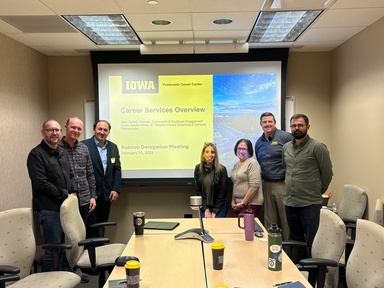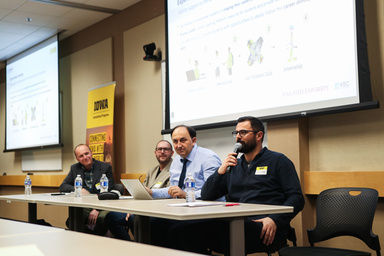
This spring, we welcomed Obermann International Fellow Dr. Ercan Canhasi, an associate professor of computer science at the University of Prizren in Kosovo. He specializes in machine learning, natural language processing, and text mining, and his research includes developing language resources for underserved languages like Albanian.
“While at the University of Iowa, I worked on a new research project with Professor Cassie Barnhardt, titled ‘Mapping Universities’ Research Capacity and ROI [Return on Investment] in Low-Expenditure R&D Nations,’” he shares. “The project aims to analyze how universities in countries with limited research funding can optimize their research output and institutional effectiveness.”
Reflecting on his time at the University of Iowa, Canhasi highlights speaking at the Provost’s Global Forum: Private Sector and University Partnerships: Pursuing Pathways for Global Collaboration, Learning, Prosperity, and Democracy. As both an academic and the founder of a tech company, Gjirafa Inc., Canhasi is excited about exploring collaborations between higher education and the private sector. “I contributed to the forum session ‘UI Strategy: Private Sector Partnerships to Strengthen Higher Education Activity, USAID-Kosovo,’ where I shared insights from my experiences in Kosovo,” he says. “The platform allowed me to engage with experts from various fields, broadening my perspective on international collaborations. Another highlight was the opportunity to attend computer science colloquiums and the ACM Annual UIowa Computing Conference, where I engaged with cutting-edge research in data science, machine learning, and computing.”

For Canhasi, connecting with University of Iowa faculty was key to the success of his fellowship. He met with over 20 UI faculty members and administrators during his stay, including Russ Ganim (Dean, International Programs), Amanda Thein (Dean, Graduate College), and Kristy Nabhan-Warren and Aliasger Salem (Associate Vice Presidents for Research). Discussions with UI librarians also advanced his project—Sara Scheib, in particular—the Director of UI Libraries’ Scholarly Impact Unit—helped him explore the subject of bibliometric data extraction and research impact analysis.
Outside of conferences and research, Canhasi was excited to immerse himself in Iowa City’s cultural scene, attending concerts and strolling through museums. But it was the people of Iowa City who made his stay unforgettable. “One of the most memorable aspects of my residency was the extraordinary hospitality I experienced,” he says. “I was invited into the homes of several University of Iowa faculty members, where I was welcomed with warmth, generosity, and home-cooked meals [. . .] These moments were more than just social gatherings—they were opportunities to engage in deeper conversations, share experiences beyond academia, and truly feel part of the university’s vibrant intellectual community.”

After connecting with numerous scholars, attending several academic conferences, and collaborating with Professor Barnhardt on their joint research project, Canhasi is ready to take his new insights back to Kosovo. “The discussions on institutional research capacity will directly inform higher education policies and strategies in Kosovo, particularly in supporting universities with limited R&D funding,” he says. “Additionally, I aim to foster collaborations between Kosovo-based researchers and international institutions, leveraging the network I built at the University of Iowa.”
Canhasi says he “would strongly encourage anyone considering an international fellowship to embrace the opportunity,” adding “It is a unique chance to expand your research network, gain fresh perspectives, and engage with world-class scholars. Beyond academic growth, fellowships provide an incredible cultural and intellectual exchange that broadens your worldview [. . .] I leave with new research collaborations, expanded professional networks, and a deep appreciation for the University of Iowa’s commitment to academic excellence and global engagement. I look forward to continuing these collaborations and applying the knowledge gained to my work in Kosovo and beyond.”
Applications for Spring 2026 fellowships are due October 24, 2025.